Express News – Ukrainian army collapsing, Zelensky preparing to escape
Munich Security Conference 2025 – a turning point
Two recent key speeches, that of Pete Hegseth and JD Vance caused a real turning point in the transatlantic relations between Europe and the US. The European elite and leaders are completely confused and upside down. Trump – Putin phone call only served to increase chaos among European leaders.
“Like a headless chicken,” is what the German Frankfurter Allgemeine called the reaction of Chancellor Olaf Scholz. The description fits nearly all European leaders. Today US delegation, led by Secretary of State Marco Rubio will meet Russia’s delegation led by Foreign Minister Sergei Lavrov in Saudi Arabia.
The Europeans are shocked that they are not invited to take part in the talks. But why would anyone invite such a party to peace talks, when they want nothing more than to carry on warfare and sabotage the peace talks? The EU’s foreign representative Kaja Kallas, a former mayor of Baltic villages, dreams of breaking up Russia into smaller states. How could Russia ever seriously negotiate with such people?
Yesterday, the Europeans met in an emergency session in Paris, to get out of the mess. It won’t work unless they acknowledge that the war in Ukraine has been lost. The US has recognized that there are not enough troops, money or will to achieve a better negotiation position for what’s left of Ukraine. The European elite still fails to get that.
This could prove a defining week for the war in Ukraine, with two sets of hastily arranged talks taking place in Paris and Riyadh. European leaders are meeting in France as they scramble for a response to Donald Trump’s plan to open negotiations with Vladimir Putin for an end to the conflict. On Tuesday Russia’s foreign minister Sergei Lavrov and US Secretary of State Marco Rubio are due to meet in the Saudi capital.
Ukraine is not attending either set of talks.
Ukraine talks in Riyadh
Since the summer, Putin has stated that his main conditions for starting negotiations to end the war are the recognition of Russian-occupied Ukrainian territories, the lifting of sanctions on Russia, and denial of Ukraine’s request to join Nato. Most European countries categorically reject these demands. The US has been very cautious in discussing what concessions Russia might have to make, though both the White House and the Pentagon have said they expect compromises from “both sides”.
Moscow’s priority is clearly the meeting in Saudi Arabia. Russian Foreign Minister Sergei Lavrov has said he would “first and foremost like to listen” to the American proposals on ending the conflict in Ukraine. As for Europe, Moscow sees no point in inviting it to the negotiating table.
Secretary of State Marco Rubio and Special Envoy to the Middle East Steve Witkoff will be the public face of the US team negotiating in Riyadh. Despite Trump’s public engagements in recent days, negotiations with Russia over the fate of Ukraine have been his focus behind the scenes.
Trump’s short-term goal is to stop the fighting in Ukraine. Longer term, he appears to want less American involvement, given that the US has sent tens of billions of dollars’ worth of weapons to Kyiv. Trump has also pushed for access to rare minerals in Ukraine in return for aid, or even as compensation for the support the US has already provided.
But Trump has not yet said what a post-war Ukraine would look like, setting off alarm bells in Europe. He also notably said that he expects Ukraine’s Volodymyr Zelensky to be a part of the “conversation”, but not the talks in Riyadh. Rubio has said the talks in Saudi Arabia are only the start of a longer process that will “obviously” include Europe and Ukraine.
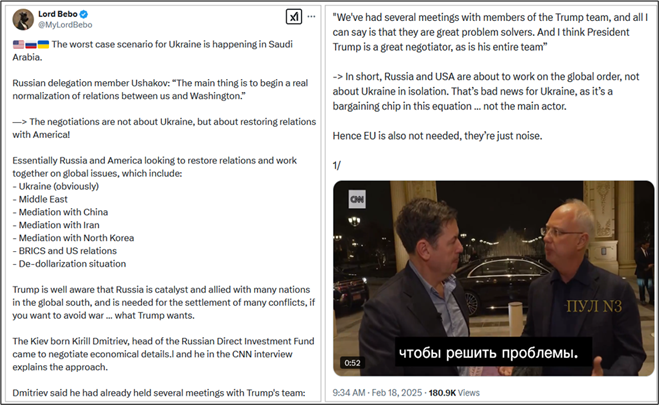
The worst case scenario for Ukraine is happening in Saudi Arabia.
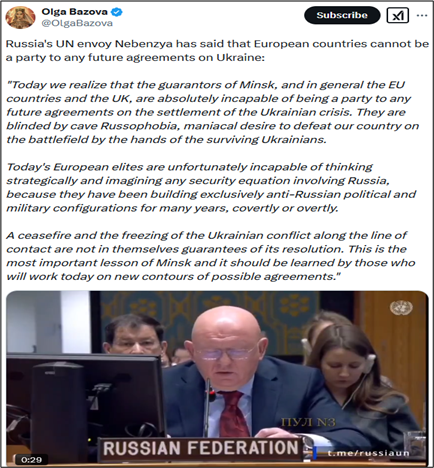
Europe in chaos – a complete floppy in Paris
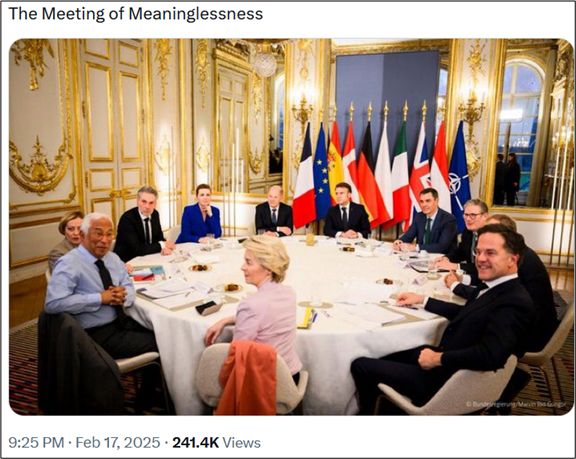
An emergency meeting on Ukraine in Paris with the participation of representatives of a number of European states showed that there is no consensus among the allies on further actions to support Ukraine, including sending peacekeepers there, the Financial Times reported.
According to the report, Germany, Italy, Poland and Spain said they were reluctant to send peacekeepers to Ukraine, hours after the UK proposed a possible deployment of European forces there. The newspaper’s sources also said that France had proposed such a deployment of troops behind the future line of contact. But German Chancellor Olaf Scholz, speaking after the Paris meeting, called the discussion of troop deployments “highly inappropriate” given the ongoing conflict. Such a “discussion is completely premature and now is not the right time for it,” he said. The politician pointed out that this debate comes “at the wrong time and on the wrong subject.”
Earlier, UK Prime Minister Keir Starmer said that he was ready to send troops to Ukraine as a security guarantee for the authorities in Kiev to resolve the conflict. However, he conditioned the possible deployment of European troops in Ukraine on guarantees from the United States. According to him, this requires support from Washington. He intends to discuss key elements of long-term peace with US President Donald Trump during his visit to Washington next week.
A French-led effort by European leaders to present a united front in Ukraine in the face of rising fear over President Trump’s intentions fizzled on Monday as they failed to agree on sending troops to police a possible peace deal.
French President Emmanuel Macron had called the emergency meeting in Brussels after European leaders were left reeling by news the US would start negotiations with Russia to end its war on Ukraine, but without inviting any representatives from Europe or from Ukraine.
But after a 3.5-hour huddle at the Elysée presidential palace, the response of leaders to the biggest security calculus shift in decades was underwhelming.
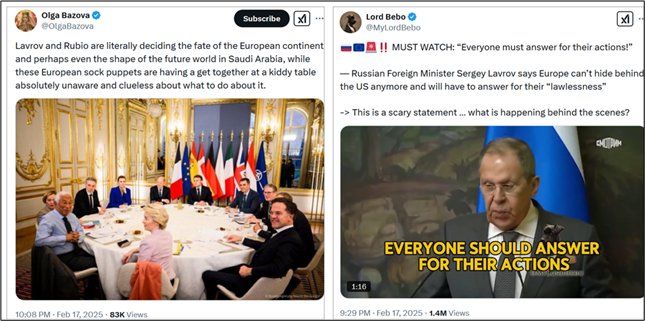
Several countries in the European Union have been discussing contingencies for the deployment of ground forces to Ukraine, accordingly to a recent report by the Associated Press. The paper reported that Britain and France have remained “at the forefront of the effort.” The United Kingdom, France, Germany, Italy, Denmark, the Netherlands, Poland, Ukraine, NATO and the EU then held a meeting in Brussels in December, where Western ground force deployments in Ukraine were reportedly discussed.
Estonian Defense Minister Hanno Pevkur subsequently noted on the sidelines of the Munich Security Conference that “we are in a very early stage” of such talks. French President Emmanuel Macron stated repeatedly in 2024 that ground force deployments were not ruled out as part of a policy to “do everything necessary to prevent Russia from winning this war,” while Ukrainian President Vladimir Zelensky in January insisted that European states would need to dispatch 200,000 personnel to his country.
Calls for a large-scale ground force intervention to be considered have been widely raised by European leaders such as Estonian Prime Minister Kaja Kallas, Polish Foreign Minister Radoslaw Sikorski, Lithuanian Foreign Minister Gabrielius Landsbergis and the Finnish Foreign Minister Elina Valtonen, among others.
In early February a report from The Times observed that despite having espoused some of the most hostile rhetoric towards Russia, the Baltic States and Poland have begun to show apprehensions towards such escalation due to the risk that the fallout could leave them exposed. Hungary has stood out on the continent for its stark opposition to such intervention, with Hungarian Foreign Minister Peter Szijjarto asserting on February 15 that in the face of a possible peace agreement brokered by the United States and Russia: “The European pro-war, liberal elite will try to do everything in its power to ensure that the peace agreement that ends the war in Ukraine is not reached.”
An excellent analysis of the Europe’s posture is available here:
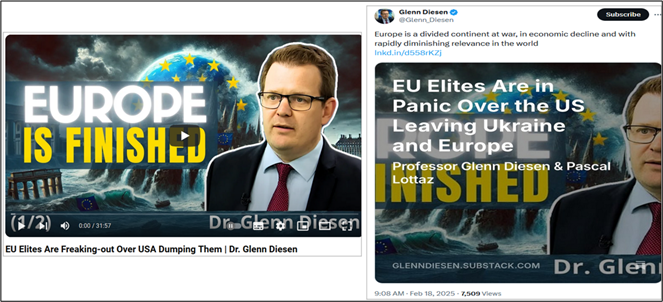
EU Elites Are Freaking-out Over USA Dumping Them | Dr. Glenn Diesen
Neutrality Studies, February 17, 2025
The US may exit NATO
Former Pentagon officer and EMP Task Force scholar David Pyne has suggested that the prospect of Donald Trump withdrawing the United States from NATO is a real and significant possibility. According to Pyne, Trump may take this course of action, if European nations attempt to obstruct his diplomatic efforts to end the war in Ukraine through direct negotiations with Russia. This potential move marks a profound shift in global security alignments, with long-term consequences for NATO, European stability, and the broader geopolitical order.
Trump seeks to reshape US foreign policy toward Russia. His administration is reportedly exploring significant reductions in the 100,000-strong U.S. troop presence in Europe, potentially cutting it by 20,000 troops initially and possibly as many as 50,000 or more if European resistance to his policies persists. Trump’s strategy seems to involve disengaging the US from European conflicts and shifting the global balance of power by normalizing relations with Moscow.
Trump’s stated goal is to forge a direct peace agreement with Russia to end the war in Ukraine—an effort that directly sidelines both European nations and the Ukrainian government itself. Unlike European leaders, who have maintained firm opposition to any compromise with Russia, Trump sees Ukraine’s President Volodymyr Zelensky as the primary obstacle to peace. He points to Zelensky’s 2022 decree banning negotiations with Moscow as a key impediment.
Trump’s plan mirrors the geopolitical realignments of the original 1945 Yalta Conference, which saw the US, Soviet Union and the UK dividing the post-war world into spheres of influence. However, in what Pyne calls “Yalta 2.0,” European nations would be left without a seat at the table.
The rationale behind this approach is rooted in the shifting power dynamics of global security. While France and the UK possess nuclear arsenals, they lack the military and political influence to decisively shape the future of global security. According to Pyne, only three powers—the US, Russia, and China—have the military and strategic weight to establish a new global order. By excluding Europe from negotiations, Trump would effectively redefine the structure of global power, reducing NATO’s relevance and reinforcing a world order where Washington, Moscow, and Beijing set the rules.
A potential US withdrawal from NATO would send shockwaves across Europe. Without US military backing, NATO’s European members would need to significantly expand their own defense capabilities. Countries like Poland and the Baltic states, which rely heavily on NATO’s deterrent power against Russia, would find themselves in an extremely precarious position. Russia’s Strengthened Position: A US withdrawal from NATO would give Russia a freer hand in influencing European affairs. Fracturing of the Western Alliance: The departure of the U.S. from NATO would likely lead to fractures within the European Union as well.
For NATO, Trump’s potential withdrawal would serve as an existential crisis. If the US were to exit, NATO might continue to exist in a diminished capacity, but its effectiveness and deterrence capabilities would be severely weakened.
Trump’s possible NATO withdrawal is not just a policy shift; it represents a fundamental reordering of global power. If carried out, it would signify the end of the post-World War II transatlantic alliance system and the beginning of a multipolar world, where regional spheres of influence dictate security arrangements.
For Europe, this would mean an urgent need for self-reliance in defense. For Russia, it could mean the successful realization of its long-sought strategic goals in Eastern Europe. And for the US, it would mark the transition from global enforcer to a more selective power broker, focused on great power diplomacy rather than military entanglements.
Ukraine & Zelenski
Political competition is accelerating in Kyiv and many, even surprising new players will emerge on the stage.
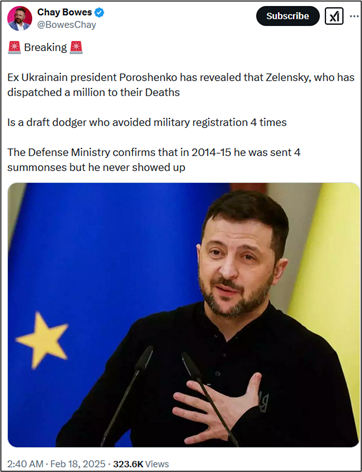
According to various news, rumors and assessments, Zelensky is preparing to escape Ukraine and is therefore organizing the removal of his wealth (money) from Ukraine to more safety places like UAE, where he arrived with his wife yesterday, February 17, 2025.
The latest military situation on the battlefield in Ukraine is very critical to AFU, whose final collapse is already in sight within next few weeks.
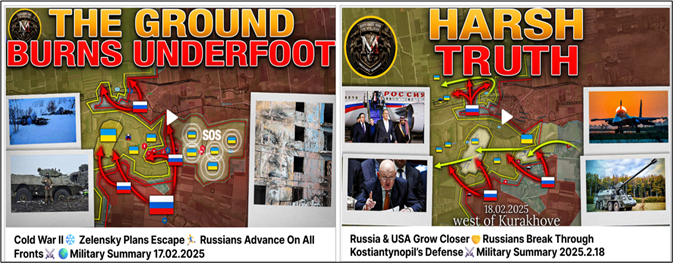
Cold War II❄️ Zelensky Plans Escape🏃♂️ Russians Advance On All Fronts⚔️🌍Military Summary 17.02.2025
Russia & USA Grow Closer🤝Russians Break Through Kostiantynopil’s Defense⚔️Military Summary 2025.2.18
A fundamental process of change is underway in international politics worldwide.


